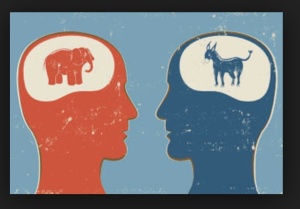 Political Socialization is the way Americans get their social beliefs. The four influences are parents, peers, media, and school. Family is generally viewed as the most significant agent of political socialization. For example, when parents teach their children to respect the authority of police officers, they are showing political socialization by teaching the importance of obedience to government officials. When families gather together on July 4 to watch fireworks shows, they are teaching their children about the significance of historic national events. When parents take their children to voting booths on election days, and even let them go into the voting booth with them to flip a switch or push a button, parents are socializing their children about the importance of voting. As children grow older, the patterns of political socialization may become more specific. While sitting around the dinner table, parents tend to discuss the policies of people currently serving in or running for office. Most children adopt the same political affiliation as their parents. Today there are many reason to political socialization and there are plenty ways of spreading it. Friends and the wider communities can also play a significant role in socializing individuals about the political world. Friends often reinforce for each other the opinions each holds. This influence is particularly significant if they hold opinions that are not popular within the larger community. People within communities have tended to share similar opinions on political matters. Individuals are politically socialized by such groups as their family, peers, and social class. Furthermore, they are socialized by existing laws, media, religion, education, their own gender, and more. This is a main reason why communities agree on certain aspects. They all collaborate with another.
Political Socialization is the way Americans get their social beliefs. The four influences are parents, peers, media, and school. Family is generally viewed as the most significant agent of political socialization. For example, when parents teach their children to respect the authority of police officers, they are showing political socialization by teaching the importance of obedience to government officials. When families gather together on July 4 to watch fireworks shows, they are teaching their children about the significance of historic national events. When parents take their children to voting booths on election days, and even let them go into the voting booth with them to flip a switch or push a button, parents are socializing their children about the importance of voting. As children grow older, the patterns of political socialization may become more specific. While sitting around the dinner table, parents tend to discuss the policies of people currently serving in or running for office. Most children adopt the same political affiliation as their parents. Today there are many reason to political socialization and there are plenty ways of spreading it. Friends and the wider communities can also play a significant role in socializing individuals about the political world. Friends often reinforce for each other the opinions each holds. This influence is particularly significant if they hold opinions that are not popular within the larger community. People within communities have tended to share similar opinions on political matters. Individuals are politically socialized by such groups as their family, peers, and social class. Furthermore, they are socialized by existing laws, media, religion, education, their own gender, and more. This is a main reason why communities agree on certain aspects. They all collaborate with another.
Political leaders and the parties they represent can also be significant influences in shaping one’s political socialization. Both individuals and their parties attempt to hold together public opinions and increase support for policies Some examples are Bill Clinton and George W Bushes press conferences. Everything we see and collaborate with in today’s society affects how we think and portray our future.
The news and television companies decide what we see as current or important news. Today Brittney Spears’ outrage is “more important” than the water shortages in Africa. In the United States, young people are socialized to accept specific American values. This includes acceptance of democracy, rule of law , respect for authorities, and the capitalist system. An example of the future generations viewing the wrong motives of importance based on the news can be explained in this article.
Political Socialization in our daily lives:
While family and school are important early in life, what our peers think and what we read in the newspaper and see on television have more influence on our political attitudes as adults. Schools partake in political socialization influences by introducing students to elections and voting when they choose class officers, and the more sophisticated elections in high school and college teach the rudiments of campaigning. Political facts are learned through courses in American history and government, and schools, at their best, encourage students to critically examine government institutions. Schools themselves are involved in politics; issues such as reforming education, funding, and government support for private schools often spark a debate that involves students, teachers, parents, and the larger community. The media is another huge way in which ideas are spread and opinions are formed. Much of our political information comes from the mass media: newspapers, magazines, radio, television, and the Internet. The amount of time the average American family watches TV makes it the dominant information source, particularly with the expansion of 24-hour all-news cable channels. Not only does television help shape public opinion by providing news and analysis, but its entertainment programming addresses important contemporary issues that are in the political arena, such as drug use, abortion, and crime. The growth of the Internet is also significant; not only do essentially all-news outlets have their own Web sites, but bloggers present a broad range of political opinion, information, and analysis.
Thanks for the post Kendra. You are absolutely correct when you say that family events and beliefs condition our political thinking. Do you think that it necessarily determines what we believe?
LikeLike